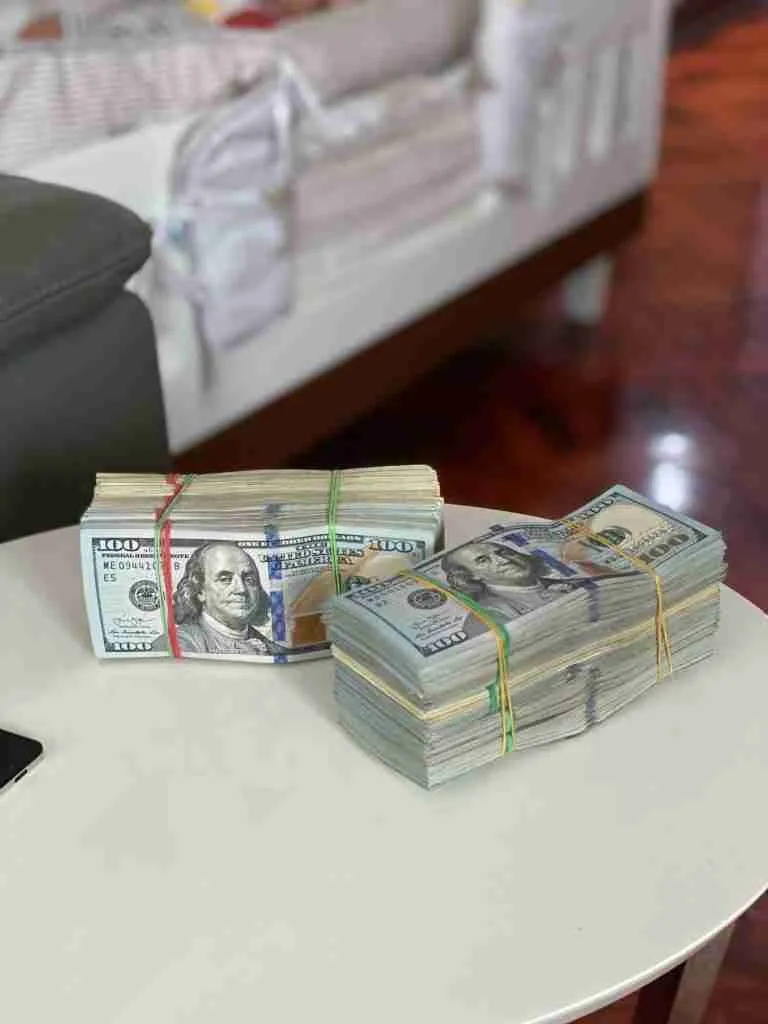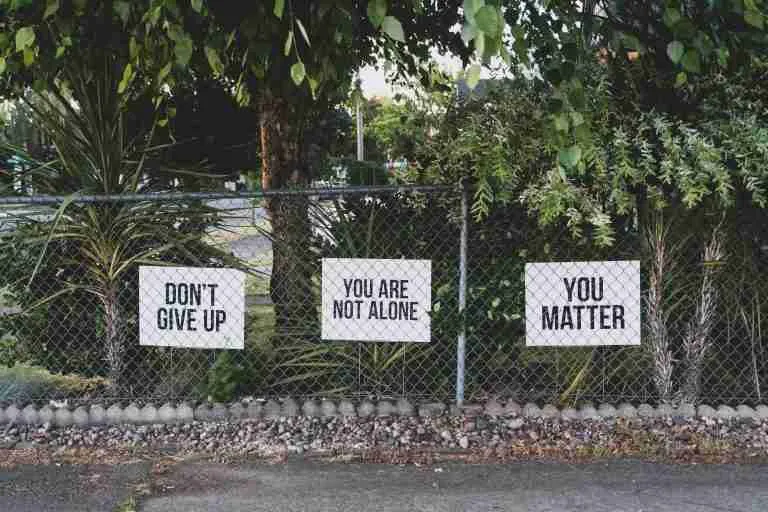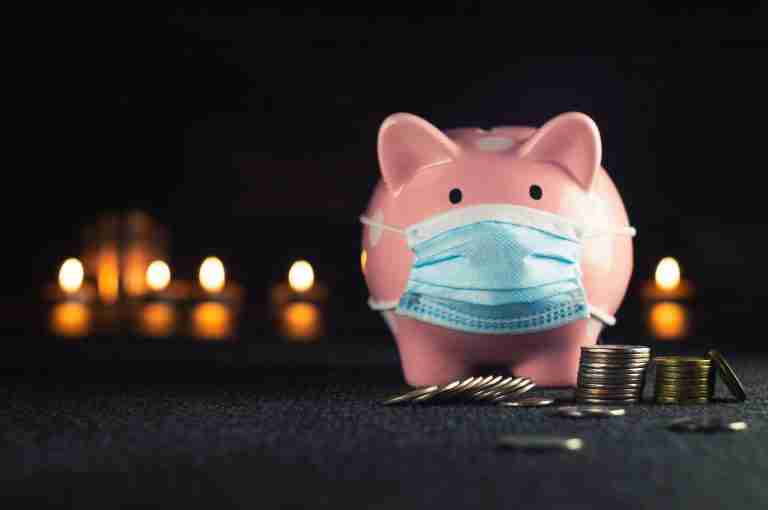Having a baby with no money? (How to prepare for a baby financially)
Having a baby with no money? Ok, life is about to get very “interesting” once the baby is almost here.
How you prepare financially for the baby will play a big part in how smoothly it goes.
Whatever happens, the arrival of a baby is messy, literally and metaphorically, so let’s get a few of the financial ducks in a row long before we hear the words “get me to the hospital, NOW!”

How to prepare for a baby with no money
Like most people, the thought of having a baby can be both exciting and daunting. And if you don’t have much money, it can seem even more overwhelming. But don’t despair!
There are plenty of ways to prepare for a baby on a budget.
One of the first things you’ll need to do is [set up a nursery]. This doesn’t have to be costly or elaborate – a simple crib, changing table, and rocking chair will do.
Look for gently used furniture or secondhand stores; you may even be able to find some items for free. Decorate with thrift store finds, hand-me-downs or DIY projects to keep costs down.
You’ll also need to stock up on some essential baby gear. A stroller, car seat and baby carrier are must-haves, but there are plenty of ways to save here too. Check with friends and family to see if they have any gently used items they’re not using anymore.
Shop at charity stores or online stores like eBay or Facebook Marketplace. And be sure to take advantage of any baby gear coupons or deals you can find!
Another expense you’ll need to factor in is diapers and wipes. Diapers or nappies alone can cost a small fortune or more per month, so it’s worth looking into ways to save here, including using reusable nappies!
5 steps to take when you’re pregnant and have no money
1. Don’t Panic
The first thing to do when you find out you’re pregnant is to take a deep breath and try not to panic. It may seem like there’s a lot to do and not a lot of time to do it, but there’s no need to rush into anything. Just take things one step at a time, and you’ll be able to figure everything out.
2. Talk to Your Partner
If you’re in a relationship, it’s essential to sit down with your partner and talk about your finances. This is a big decision for both of you, so you need to be on the same page about what you can and can’t afford.
3. Make a Budget
Once you know how much money you have to work with, it’s time to start budgeting for your pregnancy. This includes everything from doctor’s appointments and prenatal vitamins to maternity clothes and baby gear.
4. Start Saving
If you don’t have much money saved, now is the time to start. It will add up over time, even if you can only put away a few dollars/pounds each week. There are plenty of ways to save money during pregnancy, so take advantage of them.
5. Seek out Support
If you’re struggling to make ends meet, don’t be afraid to seek out support. Many organizations and programs can help pregnant women and new mothers, so don’t be afraid to ask for help.
Pregnancy is a significant life change, but it doesn’t have to break the bank. With a bit of planning and budgeting, you can prepare for a baby on a tight budget. Remember to take things one step at a time, and you’ll be fine.
How much money should you have before having a baby?
Should is a somewhat loaded word; this all depends on what sort of lifestyle you are expecting or wanting.
- Is it going to be all new designer clothes, furniture, toys and food or something more relaxed?
- Are you expecting to take a long-time off work or put your child into childcare asap?
- Are you expecting any help from family and friends and what form might this take?
You’ll probably need a spending plan to figure out what it will cost for the lifestyle you want.
- What would a basic lifestyle look like?
- What would a comfortable lifestyle look like?
- What would a luxury lifestyle look like?
If you can put a figure on these, it will help you to understand what the gap is.
Once you have guesstimated the costs and started saving towards it, you can hopefully feel calmer. The more you save, the more options you have once the baby is here.
How do I prepare for a baby with no money?
So, if you are in a weak financial position, the good news is that you have approximately nine months to get into a better one. Better start planning now as time will rush by, and before you know it, you are in charge of another human being.
Start with the end in mind
- What would good look like realistically?
- What would not worrying about money look like?
- How much money might you have saved?
- What sort of things do you think you will need to buy and what might they cost, brand new and second-hand?
- If in 9 months you had sorted everything out, what would you have done?
Once you know what good might look like you can figure out a budget for what they might cost.
| Item | Brand new | Second-hand / nearly new | Gift – who could get this for you and when? |
| Cot | |||
| Pram | |||
| Clothes | |||
| Nappies | (Or reusable) | ||
| Food | |||
| Add items | |||
| Add items |
Compare your options
With the above information, you now have nine months to plan financially for when and where you might buy these things. If you spread the costs out over the period, it will be a lot more affordable.
When should you start buying baby essentials? You can do this whenever you feel like it’s the right time. Not too soon as you start filling up the house but not too late, it’s a panic. Slow and steady to spread out the costs.
People who say, they sleep like a baby, usually don’t have one.
(Leo Burke)
How to prepare for a baby on a budget
Could you get it cheaper or free? This is a crucial question to consider on every item.
The supply of cheap and sometimes even free baby clothes, toys and basic equipment is endless.
I know it’s hard to believe, but the reason is that so many people have had babies before you. And they like many other people either overestimated or bought what they needed and now don’t want it cluttering up their house anymore.
And would you believe it babies keep growing, so you need to keep replacing what they once fitted in.
Local charity shops, baby groups, NCT groups (national childcare trust), Facebook groups, nearly new sales and on and on…..
With a bit of searching all or some of these can save you a fortune, especially on things your child might wear once(!)
Another trick is to plan out what clothes they will need and when. This is so that when people offer to but clothes you can steer them to what you want and for what season, i.e. buy us winter clothes for a six-month-old – because it will be winter when they are six months old. And not a pair of shorts because they were so cute but won’t fit until its actually winter (agghhhh!!).Lets Talk

This should cover the nappies, for a while!
What should I do financially before having a baby?
Figure out where you are starting from
Gather all your financial data together
What are your assets?
- Bank and savings accounts
- Investments??
- Pensions (even though you won’t be able to access them, it will give you the overall picture)
What are your liabilities and debts?
- Mortgage/rent
- Car loans
- Credit/store cards
- Any other loans or repayments
With the above information, you can figure out where you are starting.
With these figures, you should be able to calculate your net worth, what savings you already have access to and what repayments you need to keep on top of.
“Beware of little expenses; a small leak can sink a great ship.” – Benjamin Franklin, politician
Should I pay off debt or save for baby?
If you have identified any debts, you must ensure you keep on top of those repayments.
Who do you owe money and under what conditions, i.e., how expensive are these debts?
You must ensure you keep up with the minimum payments to avoid going into further debt with additional penalties and interest.
Think very carefully before going into further debt and put a plan together to manage what you already have.
You could use the debt snowball or avalanched methods to start reducing your debts.
If you are in a debt crisis, then the money advice service, Stepchange and National debt line can offer free advice.
A few things to consider to prevent further debts
- Lock away or get rid of your credit cards
- Cut email and social media alerts encouraging you to spend more of YOUR money with the latest hot sale offers.
- Put a spending plan together for where you want your money to go.
If you think no one cares if your alive, try missing a couple of car payments
Earl Wilson
What to do if you can’t afford a baby?
The first thing to do would be to figure out where all your money is currently going.
Is it going where you think it is going or where you want it to go?
Here’s where a spending plan (cunningly not named a budget) would be handy.
How much do you spend on essentials, and how much on your lifestyle?
Tracking your spending either from bank statements and spreadsheets or through apps will help identify if or where there are leaks.
What opportunities are there for cutting back, reducing, or changing the way or places where you spend your money.
Could you shop at cheaper supermarkets and shops?
On the flip side of cutting down your spending, could you earn more money in preparation for a baby? This could be a job move or more hours to try and increase the incoming funds.
Either way, reducing outgoings and or increasing your income, you need to set up a savings plan to set aside as much money as comfortable to build up your funds to cope with the new arrival.
“You know you’re a mom when you have more baby wipes in your purse than cash.” – Anonymous
Build up an emergency fund – as an emergency is nine months away
For many 3-6 months, living costs are a good starting point for an emergency fund – and a baby might be part of this emergency (or add to it).
Start saving towards this amount of money in your emergency fund and or your baby fund. Whether you need more might be dictated by how long you think you might be off work.
Set up a separate bank account and start saving every month towards an emergency fund right now, you won’t regret it.
Sometimes things run smoothly, and sometimes they don’t. Far better not to have money worries on the other side of a baby’s arrival if you have to have an extended time off work.
“A father is someone who carries pictures where their money used to be.” – Anonymous
What benefits can I claim if I have a baby?
Depending on where you are in the world and who you work for, there might be a number of benefits you can tap into.
- Maternity and or paternity pay and leave
- Family income and or tax relief
- Free or reduced medical bills
The best thing to do is check with your employer and local advice services (UK) as to what might be available in your particular circumstances.
FAQ: How to financially prepare for a baby
How to financially plan for a baby?
This is an exciting time for you and your family, and there are many things to consider when planning for a baby.
One of the most important things to consider is how having a child will impact your finances. Many expenses are associated with raising a child, from diapers and formula to college tuition. So it’s essential to start saving now so you’ll be prepared for the future.
Here are some tips for financially planning for a baby:
– Start saving money now. It’s never too early to start saving for your child’s future. Try to put away as much money as you can each month so you’ll have a cushion when expenses start piling up.
– Consider your maternity leave. If you plan to take time off work after the baby is born, make sure you plan to maintain your income during that time. Will you have paid leave? Will you need to take unpaid leave? Make sure you understand your benefits so you can plan accordingly.
– Make a budget. Once you know your income and expenses, sit down and make a budget. This will help you see where your money is going and where you can cut back if necessary.
– Invest in life insurance. If something happens to you, you must ensure your child is taken care of financially. Talk to your agent about life insurance options to choose the right coverage for your family.
– Review your benefits. If you have health insurance through your employer, take some time to review your policy. Make sure you understand what is covered and what isn’t. You may need additional coverage to ensure you’re prepared for unexpected medical bills.
By following these tips, you can help ensure that you’re financially prepared for the arrival of your new baby.
How much money should I save before having a baby?
There is no ideal answer to this question since everyone’s situation is different.
However, having at least six to nine months’ worth of living expenses is generally advisable before having a baby.
This will help you weather any unexpected costs or financial challenges that may arise during those first few chaotic (but wonderful!) months with a new baby in the house.
Plus, it’s always good to have a cushion in savings for emergencies.
How to start saving money for a baby
Here are a few tips for how to financially prepare for a child
– Start with a budget – know your numbers coming in and going out
– Create a savings account specifically for the baby
– Cut back on unnecessary expenses
– Set aside money each month to save for the baby
– Look for deals and discounts on items you need for the baby
– Reuse and recycle items whenever possible
– Get creative with your savings plan to make it work for you and your family
How to afford a baby when you’re broke?
When affording a baby seems challenging due to financial constraints, there are strategies to help. Create a budget, explore financial assistance options, use community resources like baby banks and food banks, consider second-hand baby items, utilize healthcare options like the NHS, build a support network, plan for the future, and seek guidance from professionals and local organizations specializing in assisting families in need.
How much money should you have saved before you have a baby?
The amount of money you should have saved before having a baby can vary depending on various factors, including your individual circumstances, location, and personal preferences.
While no fixed amount suits everyone, financial experts generally recommend aiming to have a solid financial foundation in place.
This may include having savings equivalent to at least three to six months’ worth of living expenses to cover unexpected costs or emergencies.
Additionally, consider saving for anticipated expenses related to pregnancy, childbirth, and early childcare, such as medical bills, baby essentials, and childcare costs. It’s important to assess your own financial situation, create a budget, and save as much as you can comfortably afford before starting a family.
Consulting with a financial coach can also provide personalized guidance based on your specific circumstances.
Can you ever be financially ready for a baby?
While it’s important to strive for financial stability before having a baby, it’s challenging to be fully prepared in every aspect.
Parenthood comes with unexpected expenses, and it’s normal to feel uncertain. Instead of aiming for absolute readiness, focus on practical steps like budgeting, saving, and preparing for anticipated costs.
Build a support system and seek advice from professionals and available resources.
Remember, emotional readiness and adaptability are equally important. Parenthood is a learning journey, and you can adjust along the way.
How much money do you need a month for a baby?
The amount of money needed per month for a baby can vary depending on various factors, including your location, lifestyle, and individual circumstances. It’s important to consider various expenses associated with raising a baby. Some common monthly costs include:
Nappies and toiletries: The cost of diapers, wipes, and other toiletries can vary depending on the brand and quantity needed.
Formula or breastfeeding expenses: If you choose formula feeding, formula costs should be factored in. Breastfeeding may still incur costs for breastfeeding accessories, such as breast pumps or nursing bras.
Baby food and feeding supplies: As your baby starts solids, there will be expenses related to baby food, utensils, and dishes.
Clothing and basic essentials: Babies grow quickly, so budget for regular purchases of baby clothing, as well as basic essentials like bibs, blankets, and burp cloths.
Healthcare expenses: This includes routine check-ups, vaccinations, and potential medical expenses. Although many of these are free at the early stages.
Childcare costs: If you require childcare services, such as daycare or a nanny, allocate a portion of your monthly budget for these expenses.
Miscellaneous costs: Other potential expenses may include toys, books, babyproofing supplies, and transportation costs related to outings or appointments.
It’s essential to create a realistic budget based on your specific circumstances and research average costs in your area. Consulting with parents, or financial coaches, or utilizing online resources can provide you with more accurate estimates to help plan your finances effectively.
Summary: Having a baby with no money. How to financially prepare for a baby
Plan, budget, and save for what you want life to look like when the baby arrives.
Get your paperwork together to understand what you own and owe.
Deal with your debt. Put a plan together to ensure you meet all your minimum payments but also don’t take on any further debt.
Figure out where all your money is currently going and see if you can cut down, cut out or change how much you spend.
Build up an emergency fund of 3-6 months or longer as an emergency is now on its way.
Figure out what benefits you might be entitled to through your work or government schemes.
| Having a baby with no savings | Description: Having a baby with no money |
|---|---|
| Evaluate your financial situation | Assess your current financial status, including income, expenses, and debts, to understand your financial limitations. |
| Create a budget | Develop a comprehensive budget that includes all anticipated costs associated with having a baby, such as healthcare, diapers, etc. |
| Seek financial assistance | Research and explore available government programs, grants, or charitable organizations that provide financial support for families in need. |
| Plan for healthcare expenses | Investigate healthcare options, such as Medicaid or other low-cost insurance plans, to ensure access to prenatal and postnatal care without incurring excessive costs. |
| Build a support network | Reach out to family, friends, and local community resources to create a network of support, which may include assistance with childcare, clothing, or other necessary baby items. |
| Obtain second-hand items | Look for second-hand baby items, such as clothing, furniture, and equipment, through online marketplaces, thrift stores, or local community groups, to reduce expenses. |
| Focus on essential purchases | Prioritize necessary baby items, such as diapers, formula (if not breastfeeding), and a safe sleeping arrangement, while postponing non-essential items until financial stability improves. |
| Explore low-cost or free activities | Research low-cost or free activities for babies and parents in your community, such as parenting support groups, community centers, and libraries, to engage in enriching experiences without financial strain. |
| Seek community resources | Tap into community resources, such as food banks, baby pantries, and social services, that can provide assistance with essential items like food, formula, and baby supplies. |
| Plan for future financial stability | While managing immediate expenses, develop a long-term financial plan by setting savings goals, exploring educational or career advancement opportunities, and seeking ways to improve your financial situation. |
Need a Helping Hand with Your Finances? 🤝💰
If you’ve made it this far, congratulations! You’re already taking steps towards a healthier financial future. But maybe you’re feeling a bit overwhelmed. Maybe the thought of budgeting, saving, and investing still makes you break out in a cold sweat. Don’t worry, you’re not alone, and help is available.
At Financially Happy Money Coaching, I understand that money isn’t just about numbers. It’s about emotions, behaviours, and life choices. That’s why we’re here to help you take the stress out of money and build wealth in a way that aligns with your values and lifestyle.
Whether you’re just starting out on your financial journey or you’re looking to take your finances to the next level, we’re here to guide you every step of the way. I’ll help you understand your financial behaviours, set realistic goals, and create a personalized plan to achieve those goals.
So, why wait? Start your journey towards financial happiness today. Remember, the best time to start was yesterday. The second best time is now.
Click here to schedule your consultation and let’s make your money work for you, not vice versa. 💪💰
Remember, financial freedom isn’t a destination; it’s a journey. And every journey is easier when you have a guide. So, let’s embark on this journey together and create a financially happy future. 🚀💸







